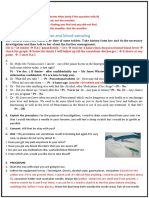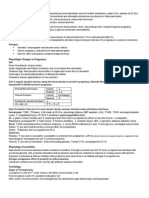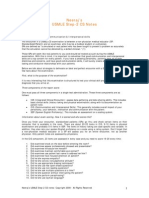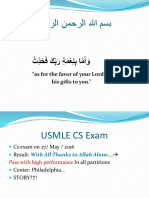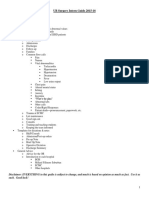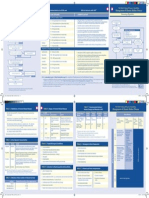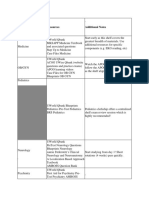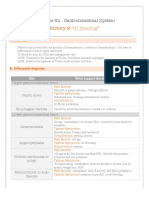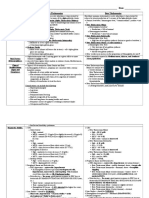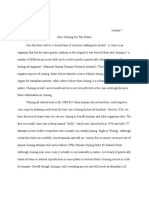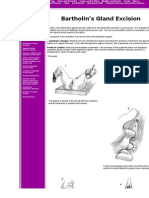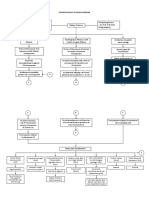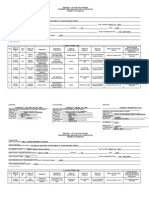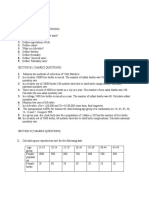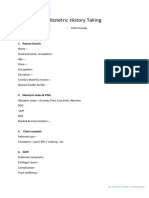Ob Gyn
Ob Gyn
Uploaded by
AstariAnnemarieCopyright:
Available Formats
Ob Gyn
Ob Gyn
Uploaded by
AstariAnnemarieOriginal Title
Copyright
Available Formats
Share this document
Did you find this document useful?
Is this content inappropriate?
Copyright:
Available Formats
Ob Gyn
Ob Gyn
Uploaded by
AstariAnnemarieCopyright:
Available Formats
Ob/Gyn Books
What Students Said... Textbooks - Essentials of Obstetrics and Gynecology (Beckmann) Review Books - First Aid for Ob/Gyn and/or First Aid for Step II CK - Blueprints for Ob/Gyn Case Books - Case Files for Ob/Gyn A very good textbook. Easy to read. Try to read within first month of rotation. Has many good pictures. Good overviews Absolute must! Nice overviews and quick read. Absolute must! Excellent book. Worked well throughout the rotation. Try to read twice with rapid read through second time 2 days before test. Nice selection of questions with good explanations. Great questions (about 200), similar to shelf exam.
Question Books - Pretest for Ob/Gyn Question Banks - USMLE World
Other Resources Students Used: Kaplan Q book, Q bank (ok), First Aid OR (especially if first rotation/before surgery), First Aid Wards (especially if first rotation), High Yield Fill Your Pockets - Maxwells - Pharmacopeia/ePocrates - Mini Spiral Notebook Nice outlines for SOAPs, OR notes Great to look up dosages and classes of drugs. Jot down notes from the day to jog your memory. You can also write down assignments/tasks and stay organized. Good way to keep track of patients for Campus Mobility. A must! Lots of quick reference on almost all areas of the field; nice diagrams
- L&D wheel - The pocket red book (Obstetrics, Gynecology, and Infertility, Handbook for Clinicians)
What to Do the Weekend Before/First Few Days
If you start with OB or nights, try to learn the stages of labor early on (Dr. Christianson will give you a great lecture on this during your first day). It is very helpful to learn how to read monitors (fetal heart tones and how they relate to maternal contractions, i.e. different types of decelerations). If you start with clinic, it is helpful to review what labs/checks are done at prenatal visits. Also, review your STDs, bacterial vaginosis, and Candida infections. If you start with Gyn, review ectopic and molar pregnancies, what a D & C is, indications for a hysterectomy and the relevant anatomy. If you do OB/GYN before your surgery rotation and have no other experience in the OR, its a good idea to review OR procedure and etiquette either in a book like First Aid for OR, the first chapter of Surgical Recall, or with classmates/fourth years that can pass along advice.
What to Do on the Floors
Be assertive and try to see patients as much as possible. Show genuine interest and try to be there for the procedures (OR or deliveries) as it often is recognized and appreciated by the residents. Keep an open mind even if youre 100% not into OB/GYN-the experience can be very rewarding and surprising. It is good to keep a book on hand (like Case Files) so that you can read during downtime, especially since a lot of sites have very demanding hours. Ob: Memorize the cardinal movements of labor within the first few days. It will help you understand the birthing process and be able to practice how to really deliver properly right from the start. Understand the monitors! Gyn: If you are going to be scrubbing into a surgery, participate in the pre-op evaluation and try to read about the indications for the procedure for your particular patient prior to the surgery. Be prepared to be a bystander but also be ready to jump in and help when given a chance to do so. Generally speaking, each hospital is different, but days on the floor commonly go as follows: Ob: pre-round/round on patients in the morning, review of the L&D board, monitoring of laboring patients/deliveries/C-sections/triage throughout day Gyn: pre-round/round on patients, surgeries through morning/early afternoon or ER consults, lectures
Preparing for the Ob/Gyn OSCE & SHELF
OSCE: Not very difficult so do not stress about it. It consists of conducting an H & P on an Ob or Gyn patient and then performing a pelvic exam on a model (do not pop out the uterus! ) SHELF: Study all of Ob during the Ob month and all of Gyn during the Gyn month (if your rotation is split up this way). You can review both during the last week (since you generally tend to have the week of the SHELF free of rotation due to the OSCE and SHELF Review by Dr. Christensen). If you use the textbook, try to read through the respective section during the first 2-3 weeks of the rotation to get an orientation to the general principles then reemphasize the concepts with the other review books you choose to use. Case files is great to go through twice before the exam. Dr. Christensens review at the end is money for the SHELF. Try to attend it as he will review the major concepts of Ob/Gyn.
Ob/Gyn Site-Specific Advice
Site Harper/Hutzel What Students Said Try to read during downtime because you really do not have much study time outside the hospital. However, you see a lot so try to learn from each patient you see. Dr. Christensens weekly sit-down rounds were very good and he practically grooms you for the SHELF. Watch out for the DO students-they can snipe patients! Be aggressive and interested. Great patient diversity! Try to read during downtime because you really do not have much study time. Not as much student autonomy as other places but still a great site. There was free food too! Generally a good site-sees a lot of unique cases. Be nice to the nursing staff-they can make or break you! Can be a tougher/more boring time for male students on L&D (lots of Muslim patients). Long hours (6AM-7PM while on L and D, 7PM-8AM while on nights; can get late while on surgery and consults too) but good teaching from midwives and residents while there. You do 1 week of L & D, 1 week of nights, 1 week of clinic, 1 week of Gyn Onc, 1 week of consults, and 1 week of Gyn surgery. You choose who you will evaluate you (give them evals and follow up to make sure they do it). While on nights, split up your time between consults and L&D (variety makes the night go faster). Will be at West Bloomfield campus for 2 weeks, which is nice. If you live near the area, may want to request
St. John
HFHS
Providence St. Joe (Ann Arbor)
nights and L&D there since those have the longest hours. If you want to be involved w/care instead of shadowing, must be vocal about it. No formal didactics (just student presentations w/faculty facilitating discussion), so be prepared to do more independent reading than w/other rotations. The teaching is good but somewhat inconsistent; take advantage of the better hours for more home study. Be proactive in your learning. The residents and staff are very nice and willing to teach. If youre proactive, there is good opportunity to get involved. Be prepared to read on more unique situations/patients since less volume than other hospitals often means more run of the mill cases.
You must be aggressive and go after what your interested in or you may fall through the cracks. Bring a book/notes to read and be proactive. Make your own opportunities and ask lots of questions. Lots of OR experience. Be very proactive and aggressive or you wont get to do much. The teaching can be lack-luster but Dr. Kwaiser and his group were great
Oakwood
Beaumont
Sinai Grace
There can be lots of down time, so bring materials and be ready to study. The staff are very student friendly. Very nice hours (no weekends), but two weeks of nights that can be very slow.
Useful Note Templates
Maxwells has outlines for an Operative Note, Delivery Note, for Vaginal & CSection Deliveries, and SOAP Note for when you round on patients who had delivered the previous day. These are very useful.
You might also like
- Vancouver Notes for Internal Medicine: High-Yield Consult GuidesFrom EverandVancouver Notes for Internal Medicine: High-Yield Consult GuidesRating: 5 out of 5 stars5/5 (1)
- Breastfeeding Uncovering Barriers and Offering SolutionsDocument6 pagesBreastfeeding Uncovering Barriers and Offering SolutionsSuéllen EmidioNo ratings yet
- Internal Medicine Highlights by Conrad Fischer (2008) PDFDocument34 pagesInternal Medicine Highlights by Conrad Fischer (2008) PDFLi SacNo ratings yet
- Internal Medicine 1 Conrad FischerDocument35 pagesInternal Medicine 1 Conrad Fischerjaber fathiNo ratings yet
- Michael W, Comat ImDocument63 pagesMichael W, Comat ImSeanNo ratings yet
- Neurology Shelf Exam Review - Part 4Document11 pagesNeurology Shelf Exam Review - Part 4CoolrobertizNo ratings yet
- EM MS3 Clerkship StudyGuideDocument9 pagesEM MS3 Clerkship StudyGuideMatthew SchneckNo ratings yet
- All Notes Prepared Summed Up PDFDocument326 pagesAll Notes Prepared Summed Up PDFrsimranjitNo ratings yet
- Clinical Clerkship Survival Guide: USF Morsani College of Medicine Class of 2020Document56 pagesClinical Clerkship Survival Guide: USF Morsani College of Medicine Class of 2020Lawangeenz40% (5)
- The 10-Minute Physical Exam: recognizing medical syndromesFrom EverandThe 10-Minute Physical Exam: recognizing medical syndromesNo ratings yet
- SURVIVOR’S GUIDE Quick Reviews and Test Taking Skills for USMLE STEP 3From EverandSURVIVOR’S GUIDE Quick Reviews and Test Taking Skills for USMLE STEP 3Rating: 5 out of 5 stars5/5 (1)
- HormonesDocument31 pagesHormonestuvvacNo ratings yet
- Obesteric Gynacology Short Notes For Usmle Step 2Document32 pagesObesteric Gynacology Short Notes For Usmle Step 2Rodaba Ahmadi Meherzad100% (1)
- CCMSA Form 3Document88 pagesCCMSA Form 3cnonsowonNo ratings yet
- Neeraj CS NotesDocument27 pagesNeeraj CS NotesRohi Afa100% (1)
- AAFPDocument39 pagesAAFPAnnaNo ratings yet
- Obgyn Step 3 Notes 140123143640 Phpapp02Document18 pagesObgyn Step 3 Notes 140123143640 Phpapp02anna grass100% (1)
- USMLE Step 2 CK 6 Months Study Plan For 240Document1 pageUSMLE Step 2 CK 6 Months Study Plan For 240DhritisdiaryNo ratings yet
- Clinical 4 PacesDocument202 pagesClinical 4 PacesMohammadAbdurRahmanNo ratings yet
- U.S. Preventive Services Task Force (USPSTF) Recommendations - Stats - Medbullets Step 2 - 3Document5 pagesU.S. Preventive Services Task Force (USPSTF) Recommendations - Stats - Medbullets Step 2 - 3mtataNo ratings yet
- UwiseDocument26 pagesUwiseAyodeji SotimehinNo ratings yet
- CardiologyDocument8 pagesCardiologykhalidzubairiNo ratings yet
- CS PresentationDocument38 pagesCS PresentationMarriam Malik100% (3)
- High Yield NotesDocument211 pagesHigh Yield Notesroad2successNo ratings yet
- Step 3 ExperienceDocument3 pagesStep 3 ExperienceAndrewNo ratings yet
- Guide To The OBGYN Shelf - StepwardsDocument5 pagesGuide To The OBGYN Shelf - StepwardsJamesHowsonNo ratings yet
- 2017-2018 Intern GuideDocument31 pages2017-2018 Intern GuideaskjagNo ratings yet
- Preventive Health: Based On The USPSTF 2014Document42 pagesPreventive Health: Based On The USPSTF 2014Louella CarpioNo ratings yet
- Case Files Family MedicineDocument19 pagesCase Files Family MedicineAztecNo ratings yet
- CREOGStudy FinalDocument2 pagesCREOGStudy FinalVaidehi Mujumdar0% (1)
- CKD PocketGuideDocument2 pagesCKD PocketGuidelayzierainNo ratings yet
- Assessment of The Acutely Ill PatientDocument10 pagesAssessment of The Acutely Ill PatientZacmilo Dela TorreNo ratings yet
- PANCE Prep Pearls Valvular Disease PDFDocument4 pagesPANCE Prep Pearls Valvular Disease PDFkatNo ratings yet
- Step2 CS NotesDocument50 pagesStep2 CS Notesvarrakesh100% (2)
- Family Medicine PresentationDocument53 pagesFamily Medicine PresentationNancy BaggaNo ratings yet
- Clerkship Resources Additional NotesDocument4 pagesClerkship Resources Additional NotesAnnaNo ratings yet
- Surgery CP-Final (PRINT)Document126 pagesSurgery CP-Final (PRINT)Dipesh ShresthaNo ratings yet
- OME StudyGuide 2month PDFDocument5 pagesOME StudyGuide 2month PDFsrNo ratings yet
- DeVirglio NotesDocument77 pagesDeVirglio NotesAlvand SehatNo ratings yet
- ABC of Arterial and Venous DiseaseDocument4 pagesABC of Arterial and Venous DiseaseTaufik Gumilar WahyudinNo ratings yet
- 2 Approach To The Neuro Exam Feb 2011Document35 pages2 Approach To The Neuro Exam Feb 2011suaqaziNo ratings yet
- GI Bleeding HXDocument3 pagesGI Bleeding HXBitu JaaNo ratings yet
- Arrhythmia A ADocument42 pagesArrhythmia A AMohd Faizal KasnanNo ratings yet
- USMLE Step 3 Answers To ARCHER Q Bank 1-25Document15 pagesUSMLE Step 3 Answers To ARCHER Q Bank 1-25rashmiajNo ratings yet
- 2015 Step2CK SampleItemsDocument40 pages2015 Step2CK SampleItemspreethamNo ratings yet
- PCM Guidebook For History Taking and Physical Exam, Revised Final, 9-20-17Document82 pagesPCM Guidebook For History Taking and Physical Exam, Revised Final, 9-20-17anon_925247980No ratings yet
- Step 2ck Important (AutoRecovered)Document101 pagesStep 2ck Important (AutoRecovered)Aishwarya SridharNo ratings yet
- Jim's Surgery NotecardsDocument20 pagesJim's Surgery NotecardsFabian Ramirez HincapiéNo ratings yet
- Combank NotesDocument7 pagesCombank NotesVee MendNo ratings yet
- Psychiatry Chapter 3Document54 pagesPsychiatry Chapter 3Online Money In EthiopiaNo ratings yet
- USPSTF RecommendationsDocument3 pagesUSPSTF RecommendationsKevinMathewNo ratings yet
- AMBOSS 100 Day Clinical Sciences Study Plan 2020 v1Document30 pagesAMBOSS 100 Day Clinical Sciences Study Plan 2020 v1Lierre CevaNo ratings yet
- Clinical Medicine - Lecture: - Topic: - DateDocument3 pagesClinical Medicine - Lecture: - Topic: - DateqselmmNo ratings yet
- A Case-Based Approach to Interventional Pulmonology: A Focus on Asian PerspectivesFrom EverandA Case-Based Approach to Interventional Pulmonology: A Focus on Asian PerspectivesJamalul Azizi Abdul RahamanNo ratings yet
- International Medical Graduate and the United States Medical Residency Application: A Guide to Achieving SuccessFrom EverandInternational Medical Graduate and the United States Medical Residency Application: A Guide to Achieving SuccessRaghav GovindarajanNo ratings yet
- Argumentive Essay-MjlDocument7 pagesArgumentive Essay-Mjlapi-489983945No ratings yet
- Study of Antifertility Properties of Catharanthus RoseusDocument6 pagesStudy of Antifertility Properties of Catharanthus RoseusEditor IJTSRDNo ratings yet
- ScienceDocument3 pagesScienceChristine Faith DimoNo ratings yet
- The Complications of Unprotected SexDocument33 pagesThe Complications of Unprotected Seximi ridleyNo ratings yet
- HSP Science Form 3Document30 pagesHSP Science Form 3Rafizal ShafieeNo ratings yet
- Uterine AnomaliesDocument24 pagesUterine AnomaliesAnaNo ratings yet
- 00.02.710 MSDS UOP868 Calibration StandardDocument8 pages00.02.710 MSDS UOP868 Calibration StandardMarsya MaysitaNo ratings yet
- Reproductive Health (Theory) - NCERT BasesdDocument5 pagesReproductive Health (Theory) - NCERT BasesdNishtha Jain100% (1)
- Negotiating Successful Threesomes Hand OutDocument3 pagesNegotiating Successful Threesomes Hand OutDani Sanders33% (3)
- Drawing A Family Pedigree Independent Learning Module:: D - V M S, D P, G E @Document5 pagesDrawing A Family Pedigree Independent Learning Module:: D - V M S, D P, G E @Rey PinedaNo ratings yet
- Love NeuroscienceDocument24 pagesLove NeuroscienceEdgar Alcántara100% (1)
- Bartholin's Gland ExcisionDocument4 pagesBartholin's Gland ExcisionIndra JayaNo ratings yet
- DemprojDocument106 pagesDemprojayuindriyani_7410637No ratings yet
- Camelid InfertilityDocument50 pagesCamelid InfertilitygnpobsNo ratings yet
- Iloilo City Regulation Ordinance 2015-163Document5 pagesIloilo City Regulation Ordinance 2015-163Iloilo City Council100% (1)
- Benign Gyecologic LesionDocument158 pagesBenign Gyecologic LesionArianne Joy C. TamarayNo ratings yet
- Improved Ambrette CultivationDocument3 pagesImproved Ambrette CultivationAvinash ValluriNo ratings yet
- 7 - PathophysiologyDocument3 pages7 - Pathophysiologyrozvinne angelica madronioNo ratings yet
- Fistula GenitaliaDocument35 pagesFistula GenitaliaFifi FruitasariNo ratings yet
- Smpipa 9 TsDocument26 pagesSmpipa 9 TsNoni KhairaniNo ratings yet
- PRC Sample - James DailyDocument8 pagesPRC Sample - James DailyhyattlovesbonNo ratings yet
- ICM - Sex SummariesDocument18 pagesICM - Sex SummariesRoshni Mahapatra0% (1)
- Perinat FinalDocument44 pagesPerinat FinalMaanNo ratings yet
- StatisticsDocument10 pagesStatisticsSaba mahatNo ratings yet
- Obstetric History Taking: 1. Patient DetailsDocument5 pagesObstetric History Taking: 1. Patient DetailsGokul AdarshNo ratings yet
- G-7 Research Newton (Chapter 2 RRL)Document14 pagesG-7 Research Newton (Chapter 2 RRL)Gas IniansNo ratings yet
- Human Sexuality and Sexual HealthDocument30 pagesHuman Sexuality and Sexual HealthGayathri R0% (1)
- Arachnids of Medical Importance (Ticks and MitesDocument26 pagesArachnids of Medical Importance (Ticks and MitesCLEMENT100% (1)








